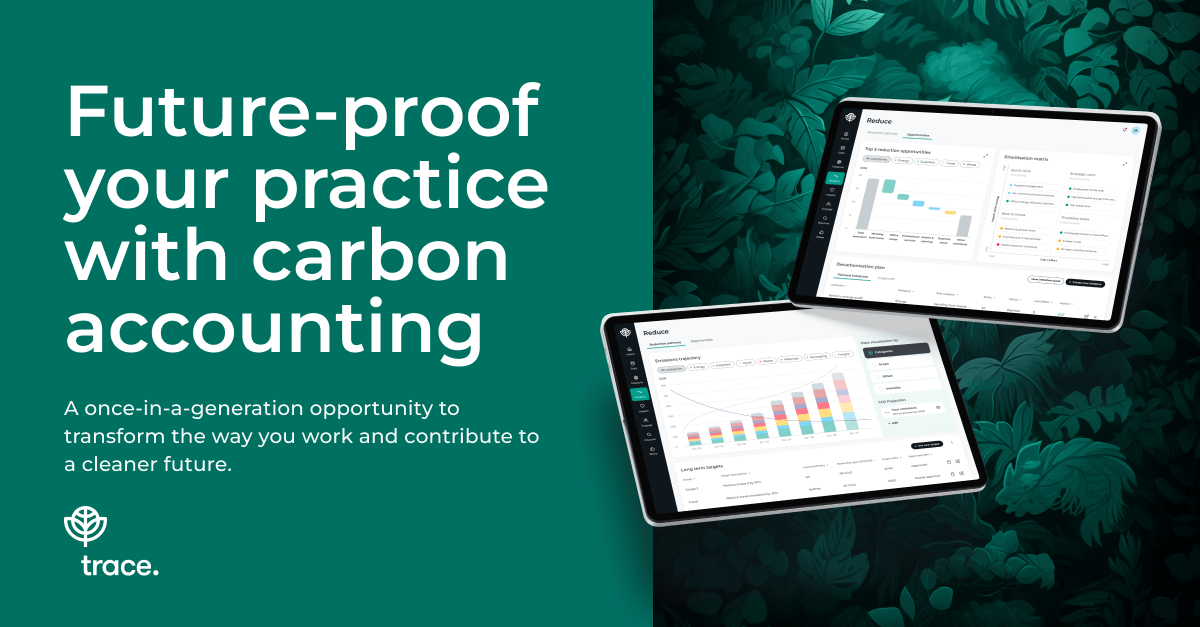First, we will cover the 101s of net zero: what it means, why it matters and how to get there. Second, we will cover the regulatory drivers and legislative motivators that are shaping carbon as a business risk. Third, we will explain why the accounting profession is best placed to power SMEs to net zero through the practice of carbon accounting.
Part 1: the fundamentals of net zero emissions
The UK was the first major economy to legislate their net zero ambitions. They were also an early adopter of mandatory climate-related disclosure for big business. Today, there's an urgent opportunity in the UK market for accountants to accelerate action.
The opportunity for accountants lies in their advisory role to small and medium-sized businesses. You are the trusted and rigorous confidante who can support the preparation of credible reports. It is these SME clients of yours who account for more than 44% of non-household carbon emissions in the UK. Not to mention, they also play a critical (and carbon intensive) role in the supply chain of big businesses who are now seeking carbon reports from their suppliers.
Net zero was coined in 2015 via the Paris Agreement - a binding, international agreement that nation states would commit to net zero emissions by 2050 in order to prevent catastrophic global warming. In that same year, the Taskforce on Climate-related Financial Disclosures (TCFD) was launched as a standardised framework for private stakeholders to publish climate risks and opportunities on the journey to net zero. In 2023, the TCFD merged with the International Sustainability Standards Board (ISSB) following the release of the "common language" of climate disclosure in the form of ISSBs. These two disclosure standards - IFRS S1 and S2 - have set a shared baseline for reporting on climate-related risk and carbon emissions management.
At the core of net zero legislation and climate-related disclosure is the requirement to measure where carbon emissions are being produced. This measurement process is called carbon accounting, and the measurement output is commonly called a carbon footprint. Where an entity is measuring for the first time, this output is also known as a carbon baseline. The output is commonly categorised by scopes: Scope 1, Scope 2 and Scope 3. Scope 1 are the emissions that a business directly controls (such as company owned vehicles), Scope 2 are the emissions from electricity and gas consumption and, finally, Scope 3 are all indirect emissions that are produced in the supply chain of a business. For most SMEs, Scope 2 and 3 are the majority of their emissions.
At Trace, we believe that the carbon footprint is the beginning of the advisory role of accountants - not the end. In 2023, the Advertising Standards Authority deemed any and all sustainability claims to be misleading where the advertising entity had not embarked on an evidence-based journey to reducing emissions. In other words, businesses can no longer say they are sustainable by virtue of a carbon footprint measurement and the purchasing of offsets. Businesses are now being held to a higher standard on carbon accounting - you must measure, and then you must reduce. Decarbonisation is the process by which a business will make strategic decisions to reduce their carbon emissions.
Part 2: regulatory drivers and legislative motivators
It is important to understand that where an SME is not required to produce a carbon report by legislation, they will almost certainly be required by implication. This is best exemplified by the NHS which, as of April 2023 will require all suppliers with a contract over £5 million per year to produce a Carbon Reduction Plan (CRP) that covers scope 1, 2, and 3 emissions. By April 2024, CRP requirements will cover all NHS procurement activities. If you have a client in the NHS supply chain, their commercial viability is at risk if they don’t get their CRP in working order before April of next year.
And the NHS is not alone. Multinational companies like Atlassian, Salesforce, Amazon, Veritas, Astra Zeneca and so many others have already actively engaged their suppliers on the journey to net zero. It follows that carbon reporting will quickly become a licence to operate: to win contracts, to access capital, to retain clients, to acquire new ones.
For companies based in the UK, there is also legislation changing the way that SMEs think about reporting their financial and non-financial performance. One legislation that dominates the carbon reporting landscape is the Streamlined Energy and Carbon Reporting (SECR) policy. SECR requires organisations to share energy use and carbon emissions information in their annual reports. With a broader remit that extends to larger SMEs, this legislative framework is a great reminder to start upskilling in energy efficiency measures and educating your clients on the capture of energy-related data.
By upskilling your firm in the provision of carbon accounting services, you can help your SME clients respond to the changing demands of their largest clients and regulatory landscape. Even more importantly than the reactive opportunity, your firm has the chance to lead from the front and proactively advise your SME clients on the risk of carbon to their commercial viability.

Accountants won't be able to leverage this opportunity alone. Here at Trace, we have been building technology for over 3.5 years that can seamlessly integrate with your existing tech stack and workflows. We have automated the data collection process, the emissions factor selection, the scope reporting and the decarbonisation plan - which means that all you need to focus on is your client.
Want to learn more? Visit us at our-trace.com and find out about our partnership for ICAEW members.